Photographs: Paresh Gandhi/Rediff.com George Joseph in New York
George Joseph was present in the Manhattan court room when former McKinsey chief Rajat Gupta was sentenced to two years in prison.
Showing leniency and also appreciation for his humanitarian work, Judge Jed S Rakoff of the Federal District Court in Manhattan sentenced Rajat Gupta, former head, McKinsey and Co, to two years in prison for leaking insider information when he served as a director of Goldman Sachs and Procter and Gamble.
Though the judge noted that Gupta did not profit from tipping billonaire hedge fund manager Raj Rajaratnam of the Galleon group, who is serving a 11-year jail term, he also ordered Gupta to pay a fine of $5 million. There is a 90-day period for restitution of the amount.
The court also sentenced Gupta to a one year probation after serving his jail term.
On a request from Gary Naftalis, Gupta's attorney, the judge postponed the date for Gupta to surrender to prison authorities from December 11 to January 4. The judge also agreed to recommend that Gupta serve his jail term in a minimum security prison.
Please click on NEXT for more...
Judge shows leniency while sentencing Rajat Gupta
Image: Rajat Gupta, flanked by his attorneysPhotographs: Paresh Gandhi/Rediff.com
But the judge declined a motion to give Gupta bail pending an appeal. Naftalis said the judge made substantial errors in his judgment and the defence expected the appeals court to overthrow the conviction.
But the judge denied the motion, saying he did not consider there was any substantial errors in his verdict.
The judge noted that he was not following the sentencing guidelines which stipulate prison terms for 8 to 10 years in such cases. He said he was considering the human aspects and also Gupta's exemplary work, spending time and money which helped many people all over the world.
"Gupta abused the trust in him for the benefit of others. He did not get a penny from it," the judge noted.
The defence asked for more leniency, higlighting Gupta's humanitarian work as well as reading from letters requesting leniency from influential leaders including Microsoft's Bill Gates, former UN secretary- general Kofi Annan and others.
Please click on NEXT for more...
Judge shows leniency while sentencing Rajat Gupta
Image: Rajat Gupta arrives for an earlier hearing in courtWhen the court asked Gupta to respond, the India-born corporate leader said he made a terrible mistake.
He said the last 18 months of his life was the most challenging since he lost his parents in childhood.
"The jury verdict was devastating to me, my family and my many friends. I regret terribly the impact of my actions on my family, friends and the institutions I worked for."
He said he was aware that many look upon him as a role model. The case against him had affected the institutions he worked for, but they are stronger to withstand it. He said he had worked at McKinsey with integrity, always only looking for the benefit of clients.
Gupta said he had created the Indian School of Business and the American India Foundation. "I love them. They are my children. It is a disappointment that I could not serve them soon."
Please click on NEXT for more...
Judge shows leniency while sentencing Rajat Gupta
Image: Gupta with his defence attorney at an earlier court appearance"Our home was open to all," Gupta said.
"The extended family is devastated by the verdict. My wife Anita and my daughters are more than anything for me in my life. We are a loving family. Recently there were negative reports about me. I am terribly unhappy that I put them in to this situation," he added.
The judge said security fraud affects many people and the community. In view of it, the punishment for the crime has gone up in recent times.
Rakoff noted that the government's calculation of the loss for the public and gain for Rajaratam was about $18 million. But he went with a conservative analysis and took it as about $5 million and asked Gupta to pay it.
Please click on NEXT for more...
Judge shows leniency while sentencing Rajat Gupta
Image: Rajat Gupta, corporate visionary and humanitarian; now, sadly, a convictThe case attracted much attention not only because of Rajat Gupta was the first Indian to break the glass ceiling to become head of an American institution as legendary as McKinsey, but also because the US attorney for the southern district of New York, who lead the team of prosecutors against Gupta, was also Indian- American Preet Bharara.
Both men were born in India -- Gupta in West Bengal; Bharara in Punjab, 20 years apart.
In June, a grand jury convicted Gupta of conspiracy and securities fraud. He was found guilty by a 12-member jury of leaking confidential information about Goldman Sachs to Rajaratnam, a former friend and business associate, who was sent to jail last year after being convicted of insider trading.
'Rajat Gupta once stood at the apex of the international business community. Today, he stands convicted of securities fraud. He achieved remarkable success and stature, but he threw it all away,' Bharara had said after the conviction.
'Having fallen from respected insider to convict insider trader, Mr Gupta has now exchanged the lofty board room for the prospect of a lowly jail cell. Violating clear and sacrosanct duties of confidentiality, Mr Gupta illegally provided a virtual open line into the board room for his benefactor and business partner, Raj Rajaratnam,' Bharara's statement said.
Please click on NEXT for more...
Judge shows leniency while sentencing Rajat Gupta
Image: Rajat Gupta lost his investment with Raj Rajaratnam, the defence arguedGupta was found not guilty of two instances of alleged tipping of Rajaratnam, including an allegation that he divulged secrets about Procter & Gamble, where he served on the board.
Gupta's lawyers argued that the relationship between Rajaratnam and Gupta had soured by the time the alleged leaking of board room secrets occurred. Naftalis said Gupta lost his investment with Rajaratanam.
But Reed Brodsky, a federal prosecutor, said the investment losses had provided Gupta with more of a motive to tip Rajaratnam.
The United States Securities and Exchange Commission alleged that Gupta, as a member of Goldman Sachs's board of directors, tipped off Rajaratnam about Berkshire Hathaway's $5 billion investment in Goldman and its upcoming public equity offering before that information was publicly announced September 23, 2008. The judge noted this in his judgment.
Please click on NEXT for more...
Judge shows leniency while sentencing Rajat Gupta
Gupta, the SEC said, called Rajaratnam immediately after a special telephonic meeting at which Goldman's board considered and approved Berkshire's investment in Goldman Sachs and the public equity offering.
Within a minute after the Gupta-Rajaratnam call and just minutes before the close of the market, Rajaratnam arranged for Galleon funds to purchase more than 175,000 Goldman shares.
'There is no allegation that Mr Gupta traded in any of these securities or shared in any profits as part of any quid pro quo. In fact, Mr Gupta had lost his entire $10 million investment in the GB Voyager Fund managed by Rajaratnam at the time of these events, negating any motive to deviate from a lifetime of honesty and integrity,' Naftalis said earlier.
Please click on NEXT for more...
Judge shows leniency while sentencing Rajat Gupta
The insider trading by Rajaratnam and others generated more than $18 million in illicit profits and loss avoidance.
Gupta was at the time a direct or indirect investor in at least some of these Galleon hedge funds, and had other potentially lucrative business interests with Rajaratnam, according to the prosecution.
The division of enforcement further alleged that Gupta tipped off Rajaratnam with confidential information that he learned during a board posting call about Goldman's impending negative financial results for the fourth quarter of 2008.
The call ended after the close of the market on October 23, with senior executives informing the board of the company's financial situation.
'Mere seconds after the board call, Gupta called Rajaratnam, who then arranged for certain Galleon funds to begin selling their Goldman holdings shortly after the financial markets opened the following day until the funds finished selling off their holdings, which had consisted of more than 120,000 shares, the SEC alleged.
Please click on NEXT for more...
Judge shows leniency while sentencing Rajat Gupta
The SEC also alleged that Gupta also disclosed to Rajaratnam inside information about Goldman Sachs's positive financial results for the second quarter of 2008.
Goldman Sachs CEO Lloyd Blankfein called Gupta and various other Goldman outside directors on June 10, when the company's financial performance was significantly better than analysts' consensus estimates.
'Blankfein knew the earnings numbers and discussed them with Gupta during the call. Between that night and the following morning, there was a flurry of calls between Gupta and Rajaratnam. Shortly after the last of these calls and within minutes after the markets opened on June 11, Rajaratnam caused certain Galleon funds to purchase more than 5,500 out-of-the-money Goldman call options and more than 350,000 Goldman shares.'
'Rajaratnam liquidated these positions on or around June 17, when Goldman made its quarterly earnings announcement. These transactions generated illicit profits of more than $13.6 million for the Galleon funds,' the SEC charged.
Gupta is a founding partner and the chairman of New Silk Route Partners LLC, an investment firm that was originally called Taj Capital Partners and was founded by Gupta, Rajaratnam, and others in 2006.

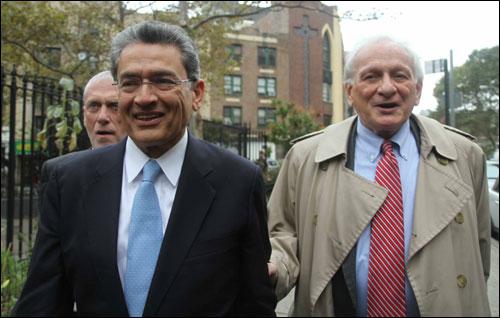

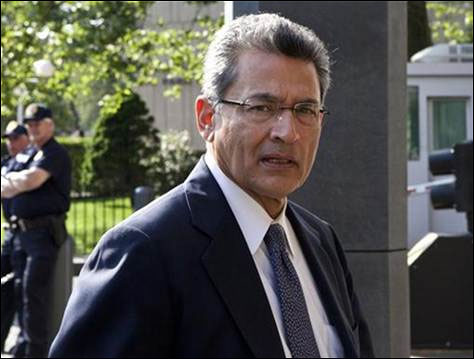
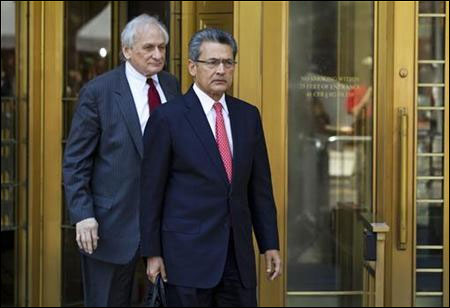
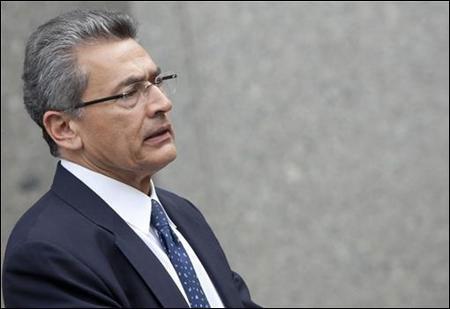
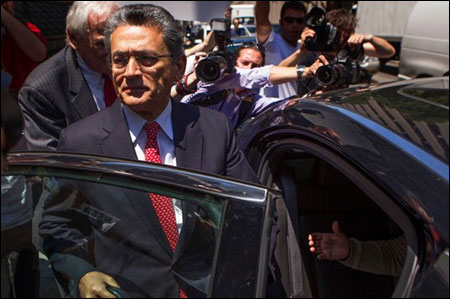
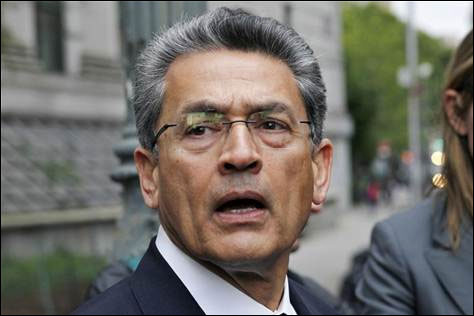
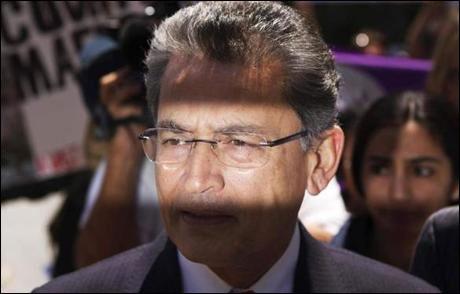
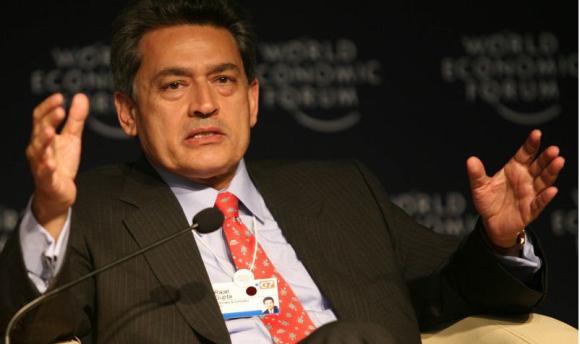
article